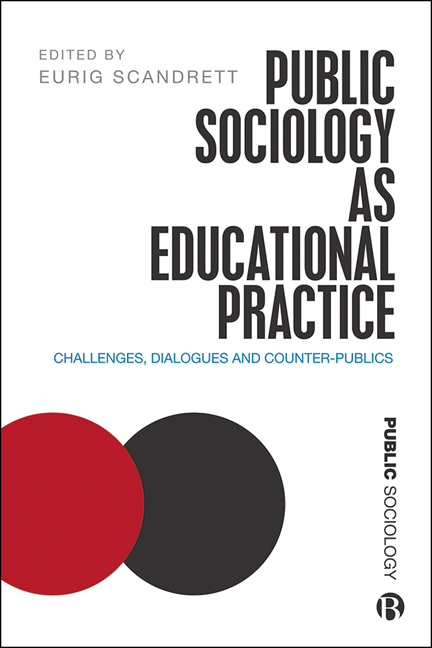III.7 - Dialogue III: Public Sociology Practices, Privatising Universities
Published online by Cambridge University Press: 02 March 2021
Summary
As a dialogue, this section engaged a wider range of participants than previous attempts. The email invitation to respond to the provocation and cases generated responses from contributors to four of the six cases, interestingly reflecting the contexts of England and Scotland; early career and recently retired academics, on more or less precarious contracts; and in ancient and modern universities. To what extent is public sociology as educational practice sustainable, even possible, within the neoliberal university? The challenges of engaging with integrity in educational practice within the neoliberal university, however that is mediated and experienced, has prompted an engaging and impassioned debate which will undoubtedly continue. Moreover, the personal cost of public sociology as educational practice has also been articulated. The context of the neoliberal university makes public sociology, and indeed educational practice with any integrity, a constant battle: exhausting, upsetting and demoralising. The medium of email exchange has mediated the emotional content, but the experience of rage, and tears, and indignation, is clearly shared by the dialogical participants.
The focus of this section is on the university, the institution in which many public sociologists are located, at least partially. To what extent does the neoliberal university provide spaces for public sociology education, for the generation of really useful knowledge with subaltern counterpublics? Elsewhere Scandrett argued that ‘The current crisis potentially makes universities privileged places for the realisation of mass intellectuality, because they are educational spaces in which the structural contradictions of neoliberal capital are so explicitly being played out’ (Scandrett, 2017: 83). Can this be argued for public sociology education? Should we understand these spaces, such as those documented in this section, to be because of (as opposed to despite) the structural contradictions of neoliberal capitalism? This assertion proved to be controversial in dialogue with the contributors.
Lena Wånggren, for example, questioned the assertion that the neoliberal university provides spaces for public sociology education, and ‘mass intellectuality’. Because (as the collection asks elsewhere) of who gets to enter this educational space of knowledge production? Who gets to be considered as knowledge producer? Many do not even have a chance to enter the university space because of institutional racism, sexism, border controls, and capitalism: tuition fees still apply in Scottish higher education institutions (HEIs) – it is only Scottish and (for now) EU students who do not pay them, and only undergraduate studies are free.
- Type
- Chapter
- Information
- Public Sociology as Educational PracticeChallenges, Dialogues and Counter-Publics, pp. 331 - 342Publisher: Bristol University PressPrint publication year: 2020



